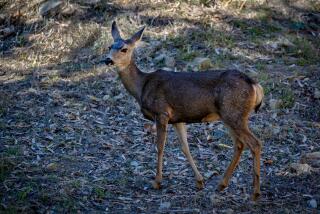Lake’s Geese Get Waddling Papers
- Share via
The meeting he had been waiting for was about to begin, but Nick Ice couldn’t resist a quick walk down to the lake, the pea-green focal point of Valencia’s Lakeshore Condominiums and of Ice’s battle for a family of geese.
A 43-year-old Minnesota native with pink skin and blue eyes, Ice was upset that the dozens of Canada geese that once migrated to the lake to breed have now dwindled to two--largely, he claims, because the condominiums’ management has changed the water’s chemical balance and forbidden residents to feed the birds.
All in the name of nature, Ice noted wryly.
Lakeshore’s board of directors decided last year to stop using chlorine and instead fill the man-made, cement-lined lake with plants and fish. “We wanted to turn it into a real lake rather than a huge swimming pool,” explained board President Jay Akers.
Then the board banned geese- and duck-feeding when it realized that the birds’ waste, once controlled by the chlorine, was now getting out of hand. “The people handling the lake could not keep up with the amount of uh, poop--you can put it in better terms--that was being produced,” said A.J. Durtschi, vice president of Lakeshore’s property manager, Bartlein and Co. Inc.
Akers said it cost the condo association about $10,000 to have the lake drained and cleaned.
On this balmy spring night, Ice, a scrappy horticulturist, had been scheduled to appear before the board for failing to pay a $50 fine for providing the geese with grain. Although the fine was dropped because a neighbor refused to provide the incriminating testimony against Ice, Ice still wanted to ask the board to appoint a “designated feeder” of the geese.
“See, they put fish in here, and a green heron showed up and started eating the fish!” said Ice of the lake, nearly as amused as outraged by the condo association’s efforts to “naturalize” a man-made body of water.
“It shows they have no idea what they’re dealing with when they put fish in. They were saying it was the geese. Geese don’t eat fish, right?”
The heron sat on a recently planted lily pad, its emerald feathers a brighter shade than the murky water. In fact, “the lake” is a shallow, glorified pond. Its artificial origins are quickly betrayed by its crude cement curbs. But as any real-estate maven will affirm, ponds have limited appeal. So there is “the lake,” meandering for three acres among modest, boxlike apartments, and the pecking order of Lakeshore Condominium residents is determined by who lives closest to its synthetic shores.
Ice, a renter, believes the geese and ducks only add to the lake’s appeal because it looks much nicer--more natural--with live birds than without.
“See the serenity of the ducks on the lake?” said Ice, a short, unpretentious former war protester who still favors jeans.
“Without them it is boring!”
Ice entered the condo meeting room, a model of suburban taste with wall-to-wall, burnt-orange carpeting. Large, color photos on the walls depict smiling couples enjoying Lakeshore’s amenities--tennis courts, a pool and hot tub. Relaxation is the byword, and the dozen or so residents at the meeting looked like happy, overgrown campers--adult men and women in neon shorts and jogging suits, ankle socks and sneakers.
But as the meeting began, one resident after another complained of faulty plumbing, dying landscaping, too many renters, neglected repairs--and Lakeshore’s veneer of comfort began to peel like the cheap wooden fencing described by one homeowner.
Jo Anne, whose orange lipstick matched her jogging pants, reported the results of her unit’s recent appraisal.
“He said Lakeshore was not a good investment at this time because the ratio of renters was too high and because of the age and appearance of the units,” she said indignantly. “I feel the perimeter properties are not being maintained with the same diligence and attention given to the lake and lakeshore properties.”
Board members acknowledged that the lake had been absorbing most of their resources but justified the expense by its importance to property values. As Akers said later, the community “couldn’t be called ‘Lakeshore’ if it didn’t have the lake.”
The board’s bird-control policy is taken so seriously that, in February, a vigilant gardener removed six goose eggs from their grassy nest. Ice reported him to the U.S. Department of Fish and Game, which fined the condo association $250 for disturbing migratory birds.
“It was a mistake. The eggs should’ve never been moved,” Akers acknowledged.
Still, Ice’s request for a designated bird feeder was turned down, even though he and art student William Fox gamely argued that it was the only humanitarian thing to do. The board punctured their sentimentality with darts of logic: Bird feed would attract rodents; wild geese can fend for themselves; droppings dirty the pond; and cleaning it is expensive.
“Are we going to have a ‘designated payer’ too?” growled one resident.
The meeting broke up, and Ice wandered back toward the lake. A flock of swallows rose from the water toward the sky--a lovely sight.
Also an ominous sign that the “natural” unchlorinated lake is now breeding mosquitoes.
“See, swallows like to eat mosquitoes,” said Ice, shaking his head at man’s folly.
“They’re concerned about their property values and don’t realize they’re biting off their nose to spite their face.”
More to Read
Sign up for Essential California
The most important California stories and recommendations in your inbox every morning.
You may occasionally receive promotional content from the Los Angeles Times.













